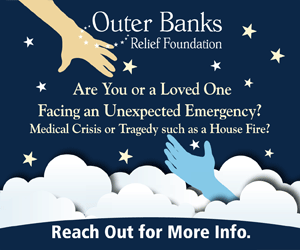As all islanders know, Hurricane Matthew was a cruel natural disaster that brought weeks of clean-up and a heavy emotional toll. I, myself, spent more than a week cleaning and scrubbing our home and doing the same to my boyfriend’s mother’s garage.
Immediately after the storm, I was fortunate enough to be able to take a week’s absence from work to stay home and take care of our own hurricane aftermath.
We had between 14 and 16 inches of water inside our house and the garage had nearly 4 feet of saltwater inside. We saved as many of our belongings as we could, and set-up a three-tub Rubbermaid station, dunking our things in a solution of bleach, cleaner, and water, then rinsing to let dry.
It has been a very emotional and trying time, especially knowing that many others fared even worse. Our island had already experienced trauma with Tropical Storm Hermine. Though we did not have damage to our home during that particular storm, we both lost vehicles because of the quick-rising tide from the Pamlico Sound. We were a bit more prepared with Hurricane Matthew, but not prepared enough.
Not everything could be salvaged. As you can imagine, we had to discard appliances, furniture, rugs, art, photographs, and more. As the roadside pile in front of my boyfriend’s property grew, we soon had a nearly empty garage and a pulled-apart home. In addition, we lost a chicken and the majority of our ducks.
Constantly reminding ourselves that our stuff was just that— stuff, we got to work with removing saltwater, sea grass, and a mucky mud mixture from our home. Three Shop-Vac machines, a 50-foot water hose, several American Red Cross clean-up kits, and gallons of Clorox later, we were on our way to cleaning Matthew’s mess.
Anyone who has lived on Hatteras Island long enough to experience a hurricane knows the drill — place discarded appliances, natural debris, and whatever belongings that have been damaged along the roadside to be picked up and hauled off.
That’s right—discarded belongings. While our roadside pile was first a mountain of substantial size, it has now dwindled down to a mere hill. Countless cars have pulled along the property line and have rummaged through our discarded belongings. We are pleased that another person looked at our pile and thought, “I could use that,” or “I could fix that.”
With that said, I also understand that this is not the thought process of all other islanders. Instead of being thankful that their once-prized and treasured things are going to be re-used or repurposed versus being hauled off to a landfill, some are resentful and incredibly angered by the idea that their trash would be used by another person and be given a new “life.”
If asked, I would not be able to count how many beautiful solid-wood pieces I have seen on the side of the road. These pieces, unlike many of the particle board pieces we had in our own home that were completely ruined by the water, only need to be washed and treated with an antimicrobial cleaner. In some cases, a fresh coat of paint, or a light sanding with some varnish can fix discarded pieces with tide-lines or deeper damage.
As a native to Hatteras Island and an incredibly frugal person who has spent many years working as a waitress and housekeeper, I have worked incredibly hard for what I do have and I understand the value of a dollar. It simply sickens me to think that some would discard their things and not want them to be reused by anyone else.
As a person who composts, recycles, and makes my own laundry detergent, the word wasteful is the best adjective that comes to mind in describing this experience. On the flip side, I do understand that we all are entitled to our own opinions and our own feelings. I also understand that there are probably people within the community who are taking advantage of the loss of others that this hurricane has brought.
Nevertheless, more than two weeks since the hurricane, these roadside piles are waiting to be collected, tossed into large dumpsters, and then hauled off to landfills. If your grandmother’s childhood solid oak dresser could be scrubbed and re-used, would you rather someone else give it new life, or would you want for it to be at the bottom of a landfill?
(Mariah James is a 25-year-old Hatteras Island native who lives in Frisco. She works as a vacation rental housekeeper and also works part-time at a building supply company. She says that she understands what this community has gone through and is so proud of how islanders pull together and help each other in adversity. With this said,” she adds, “I have some thoughts on the trash piles along the streets and highway and those being scrutinized and condemned for trying to give new life to things that would otherwise be tossed into a landfill.”)




